Best Alternatives to Heroku for Application Deployment
Written by: Hrishikesh Pardeshi, Founder at Flexiple, buildd & Remote Tools.
Last updated: Jan 26, 2025
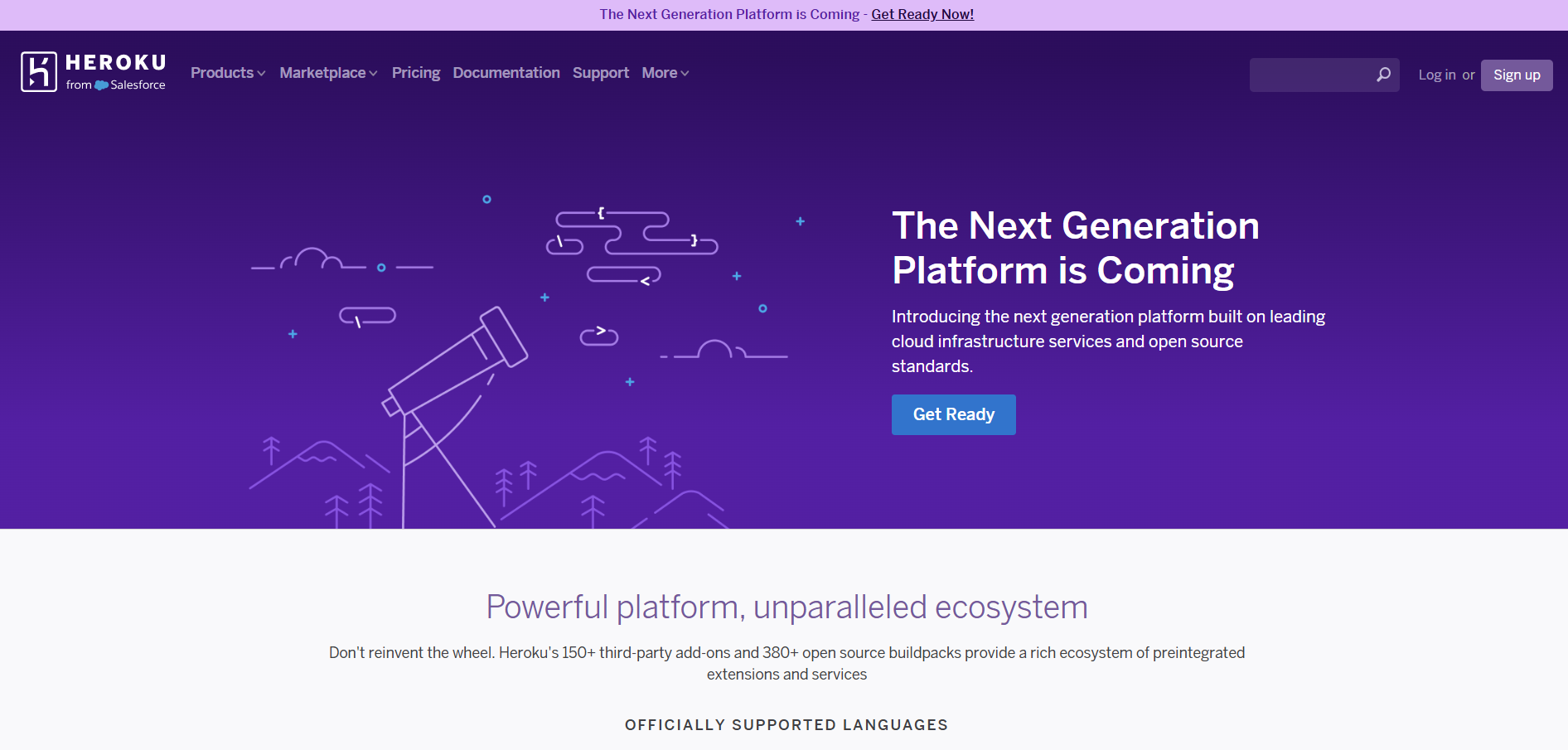
Best Heroku Alternatives in 2025 are:
AWS Elastic Beanstalk
Google Cloud Platform (GCP)
Microsoft Azure App Service
Vercel
DigitalOcean App Platform
Render
Fly.io
Netlify
If you are looking for powerful application hosting and deployment tools beyond Heroku, these alternatives provide a variety of features tailored for different needs. Whether you require advanced scalability, cost-effectiveness, or a user-friendly interface, these platforms cater to a wide range of developers and businesses. From Google App Engine, which offers both standard and flexible environments for diverse application requirements, to automated deployment using other Google Cloud services, these solutions bring unique strengths to your cloud hosting strategy. AWS Elastic Beanstalk's robust infrastructure and Netlify's focus on frontend deployments further enhance your options.
Table of Contents
Why You Need Alternatives to Heroku?
You need alternatives to Heroku because it may not always align with specific requirements such as scalability, pricing, or feature set. While Heroku is known for its simplicity and ease of use, it has limitations, particularly for large-scale applications, custom integrations, or cost-effective hosting solutions. Many alternatives to Heroku are offered by cloud service providers, which often include generous free tier options to help users get started. These alternatives provide different pricing models, advanced infrastructure management capabilities, or enhanced performance for resource-intensive applications. Additionally, they support modern workflows like continuous integration and continuous deployment, making them ideal for developers seeking more flexibility and scalability.
Who Should Consider Using Heroku Alternatives?
You should consider using Heroku alternatives if you are looking for platforms that offer better scalability, performance, or flexibility. These alternatives are especially beneficial for developers, startups, and enterprises that require:
Enhanced customization for complex applications
More competitive pricing for high-traffic websites or apps
Advanced deployment options for specific use cases
Improved control over cloud infrastructure and resources
Heroku Alternatives Comparison Table
| Feature | AWS Elastic Beanstalk | Google Cloud Platform | Microsoft Azure App Service | Vercel | DigitalOcean App Platform | Render | Fly.io | Netlify |
|---|---|---|---|---|---|---|---|---|
| Ease of Use | Moderate | Moderate | Easy | Very Easy | Easy | Easy | Moderate | Very Easy |
| Pricing | Pay-as-you-go | Pay-as-you-go | Pay-as-you-go | Free & Paid Plans | Starts at $5/month | Starts at $7/month | Free & Paid Plans | Free & Paid Plans |
| Platform Support | All major platforms | All major platforms | All major platforms | Web apps and JAMstack | Web apps | Web apps and APIs | Edge applications | Frontend and JAMstack |
| Scalability | High | High | High | High for static sites | Moderate | Moderate | High | High for static sites |
| Specialty | Enterprise-grade solutions | AI and machine learning | Enterprise integration | Frontend deployment | Cost-effective hosting | Simple and affordable | Edge deployment | Static sites and JAMstack |
Best Heroku Alternatives
If you're searching for reliable and efficient application hosting and deployment tools, exploring the best Heroku alternatives can help you find the right platform for your specific needs. These alternatives offer a range of features, from advanced scalability and cost-effectiveness to specialized solutions for modern web and application development. Below is a list of top Heroku alternatives, each tailored for different use cases and developer preferences.
1. AWS Elastic Beanstalk
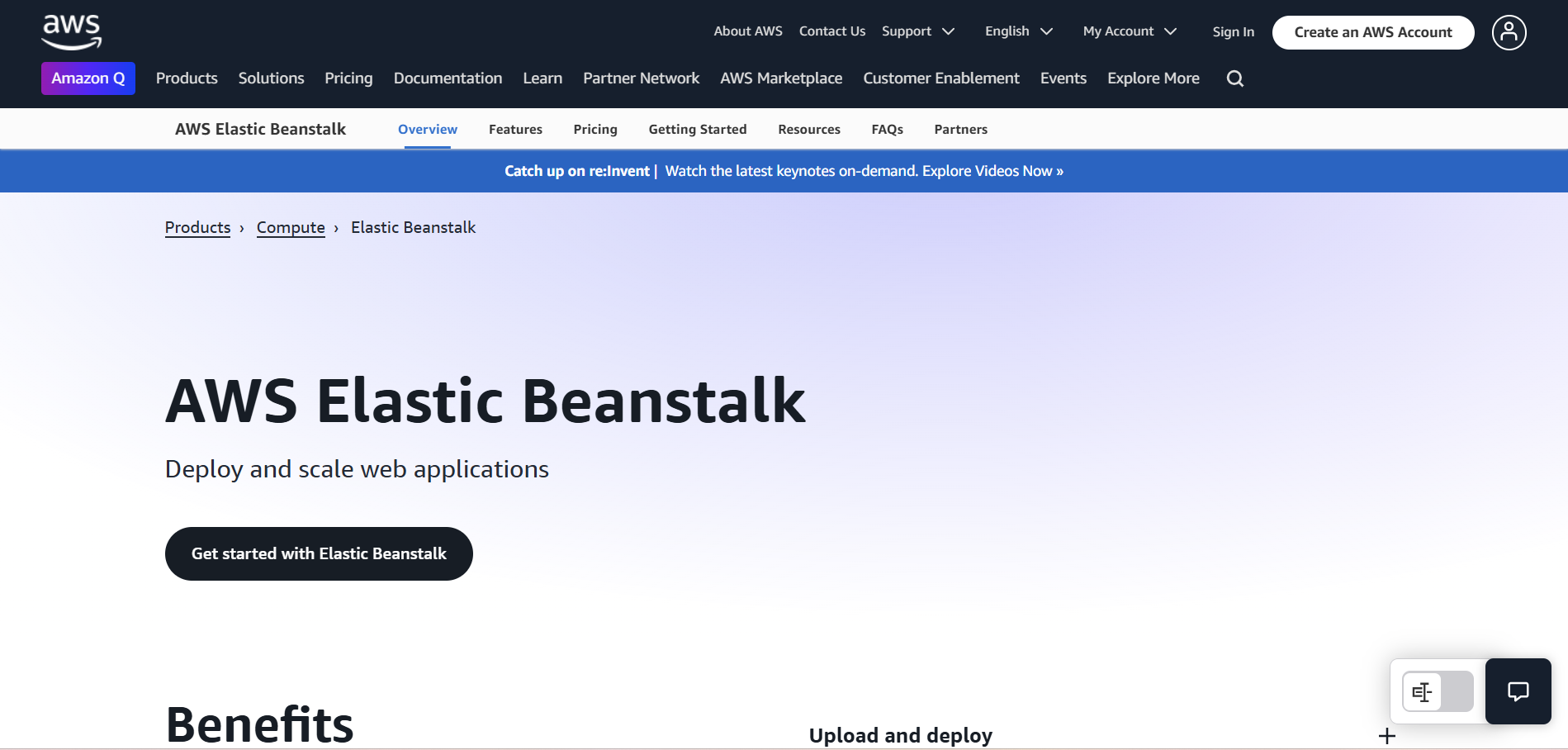
AWS Elastic Beanstalk is a managed service that simplifies the deployment and scaling of applications. It is ideal for developers who want to deploy web apps and services quickly without dealing with the complexities of underlying infrastructure. AWS Elastic Beanstalk integrates seamlessly with other AWS services, making it a strong choice for developers already using the AWS ecosystem.
AWS Elastic Beanstalk vs Heroku
AWS Elastic Beanstalk is a flexible platform-as-a-service (PaaS) that allows developers to deploy and manage applications easily. Compared to Heroku, it provides more control over the underlying infrastructure, making it ideal for businesses that need extensive configuration and scalability options. However, it requires a deeper understanding of AWS services to unlock its full potential.
Key Features of AWS Elastic Beanstalk
Supports a wide range of programming languages, including Python, Node.js, Ruby, PHP, and Java.
Automatic scaling to handle variable traffic loads.
Deep integration with other AWS services like S3, RDS, and CloudWatch.
Customizable environments with load balancing and EC2 instances.
Full control over infrastructure through AWS Management Console or CLI.
AWS Elastic Beanstalk Pros
High scalability with automatic load balancing.
Strong ecosystem of AWS tools and services.
Excellent for large-scale enterprise applications.
Pay-as-you-go pricing model with free tier availability.
Supports both web apps and RESTful APIs.
AWS Elastic Beanstalk Cons
Requires familiarity with AWS ecosystem.
Higher costs for resource-intensive applications.
More complex setup compared to Heroku.
AWS Elastic Beanstalk Pricing
AWS Elastic Beanstalk follows a pay-as-you-go pricing model. Costs are based on the AWS resources used, such as EC2 instances, S3 storage, and data transfer.
2. Google Cloud Platform (GCP)
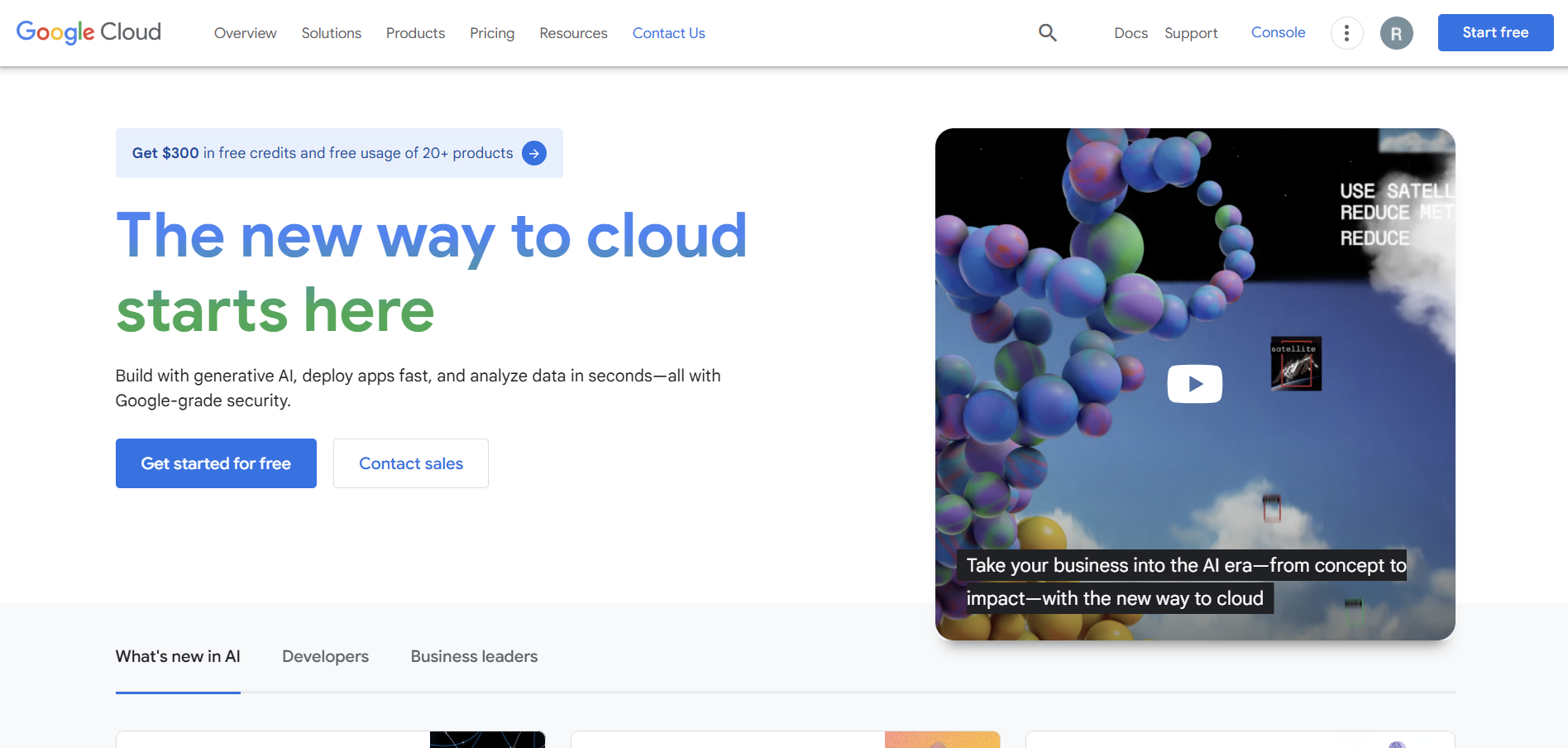
Google Cloud Platform is a comprehensive suite of cloud services designed for application hosting, storage, machine learning, and more. Its scalability and performance make it a strong competitor for Heroku, especially for data-heavy and machine learning applications. GCP’s global infrastructure ensures low-latency performance, while its developer tools and APIs simplify complex workflows.
Google Cloud Platform vs Heroku
Google Cloud Platform offers a suite of cloud services for hosting, storage, and machine learning. Unlike Heroku, GCP is more suitable for developers and organizations seeking advanced performance, custom machine learning models, and seamless integration with other Google services.
Key Features of Google Cloud Platform
Kubernetes Engine for containerized applications.
Machine learning APIs and data analytics tools.
Global infrastructure for low-latency performance.
Serverless computing with Cloud Functions.
Cost optimization tools for better resource management.
Google Cloud Platform Pros
Excellent for data-heavy applications and AI projects.
Highly scalable infrastructure.
Pay-as-you-go pricing for flexible budgets.
Integration with Google Workspace and Firebase.
Free tier available for small-scale deployments.
Google Cloud Platform Cons
Steeper learning curve for new users.
Complex billing and pricing structure.
Limited support for less popular programming languages.
Google Cloud Platform Pricing
Google Cloud Platform offers a free tier with limited resources, and pricing depends on the specific services and resources utilized.
3. Microsoft Azure App Service
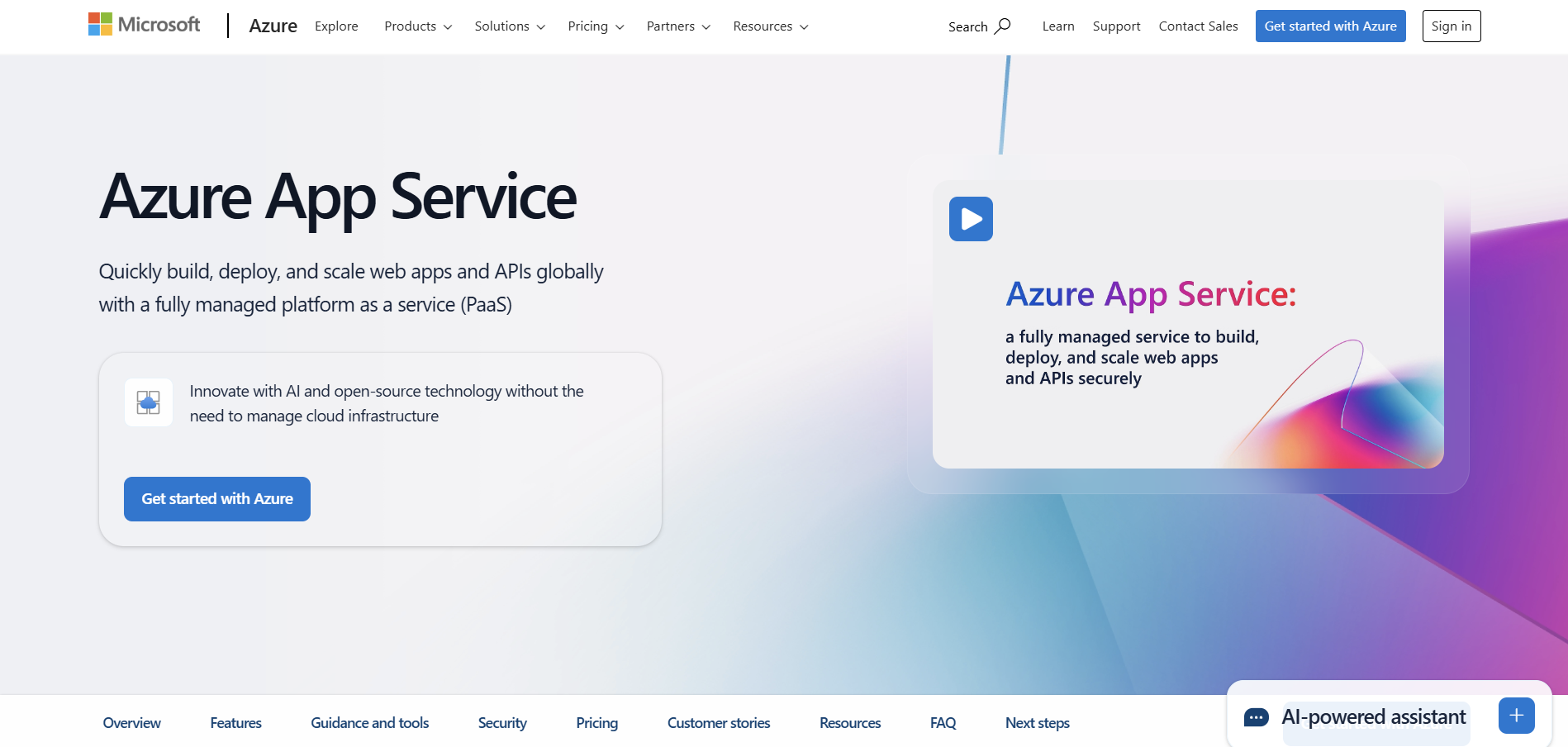
Microsoft Azure App Service is a fully managed platform designed to build, deploy, and scale web apps and APIs. It supports a wide range of programming languages and integrates seamlessly with Microsoft’s ecosystem. Azure App Service offers enterprise-grade security and is ideal for developers building applications on Windows-based systems.
Microsoft Azure App Service vs Heroku
Microsoft Azure App Service is a managed platform for building, deploying, and scaling web apps. Compared to Heroku, Azure App Service offers enterprise-grade features, better integration with Microsoft tools, and extensive support for Windows-based applications.
Key Features of Microsoft Azure App Service
Seamless integration with Visual Studio and GitHub.
Support for multiple programming languages, including .NET, Python, and Java.
Auto-scaling and load balancing for high-performance applications.
Built-in monitoring with Azure Monitor.
Advanced security features with Azure Active Directory integration.
Microsoft Azure App Service Pros
Ideal for .NET and Windows-based applications.
Extensive support for enterprise-grade solutions.
Robust scalability for high-traffic applications.
Competitive pricing for Microsoft ecosystem users.
Free tier for small-scale apps.
Microsoft Azure App Service Cons
Pricing can be higher for non-Windows workloads.
Less intuitive interface compared to Heroku.
Requires familiarity with Microsoft Azure ecosystem.
Microsoft Azure App Service Pricing
Microsoft Azure App Service offers a free tier for basic applications. Paid plans depend on resource usage and application requirements.
4. Vercel

Vercel is a frontend-focused platform that specializes in hosting JAMstack applications. It provides a developer-friendly experience with automatic deployments, global edge networks, and serverless backend functions. Vercel is a popular choice for developers working with static sites and modern frameworks like Next.js.
Vercel vs Heroku
Vercel specializes in frontend deployment and optimization, making it a great choice for JAMstack applications. Unlike Heroku, it focuses on delivering blazing-fast performance for static sites and serverless functions.
Key Features of Vercel
Easy deployment for Next.js and other static site generators.
Serverless functions for backend logic.
Global CDN for low-latency performance.
Automatic scaling and zero-configuration setup.
Real-time collaboration tools.
Vercel Pros
Optimized for modern web development.
Extremely fast and reliable for static sites.
Simplified deployment process.
Free tier available with generous limits.
Excellent documentation and support.
Vercel Cons
Limited backend capabilities compared to Heroku.
Not suitable for complex or data-heavy applications.
Free tier can have restrictions for high-traffic websites.
Vercel Pricing
Vercel offers a free tier for hobby projects and small-scale applications. Paid plans start at $20 per month for additional features and higher resource limits.
5. DigitalOcean App Platform
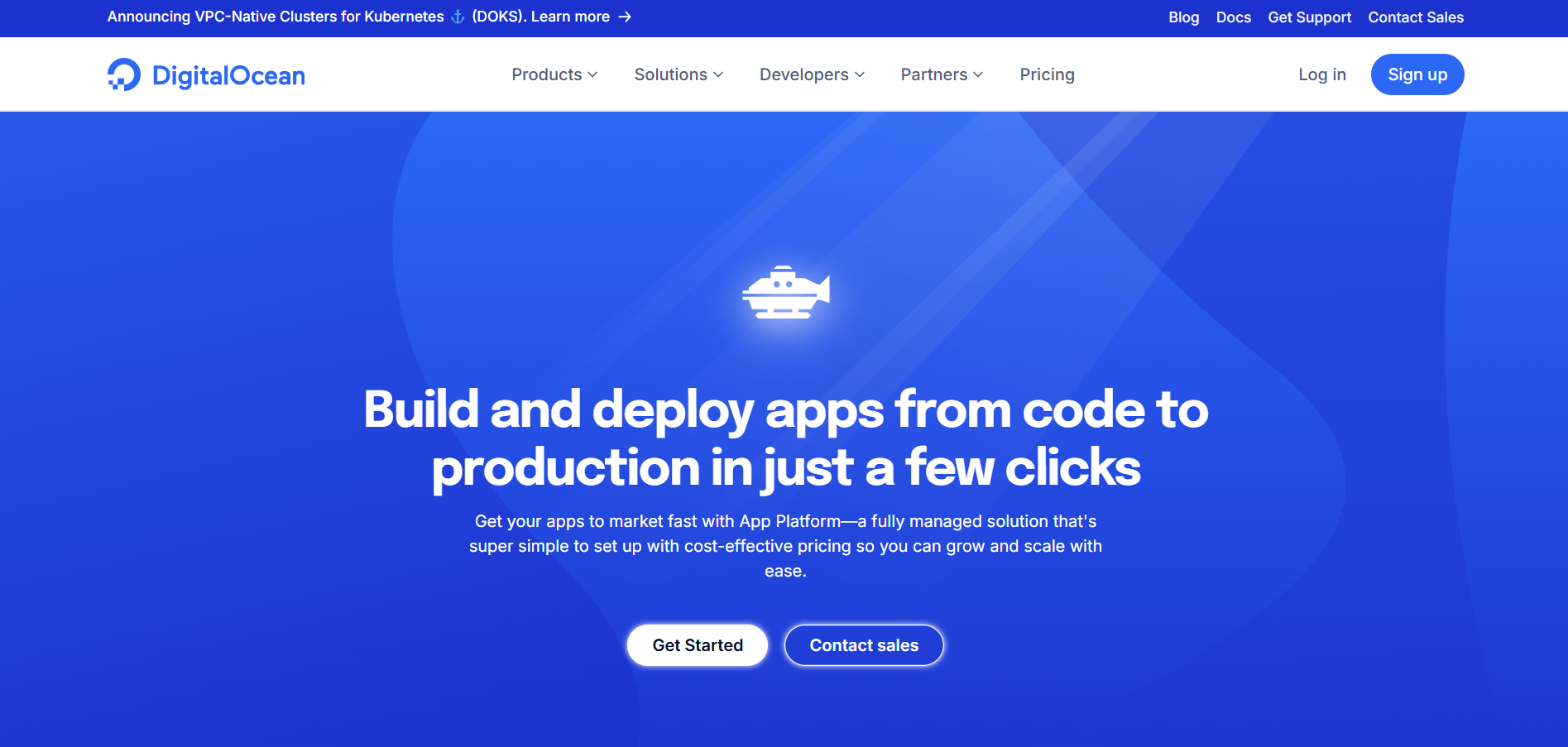
DigitalOcean App Platform is a developer-friendly PaaS designed for simplicity and cost-effectiveness. It allows for seamless deployment of applications, APIs, and static websites. With its competitive pricing and a strong focus on small-to-medium businesses, it’s an appealing choice for startups and individual developers.
DigitalOcean App Platform vs Heroku
DigitalOcean App Platform is a simple and cost-effective PaaS for deploying web applications. Compared to Heroku, it provides more affordable pricing and better control over infrastructure.
Key Features of DigitalOcean App Platform
Automatic deployment from Git repositories.
Built-in scalability and load balancing.
Support for multiple programming languages.
Developer-friendly interface and APIs.
Cost-effective pricing for small businesses.
DigitalOcean App Platform Pros
Affordable pricing for startups and developers.
Easy-to-use interface with automated workflows.
Strong community support and documentation.
Free trial available for testing applications.
DigitalOcean App Platform Cons
Limited advanced features compared to Heroku.
Less robust ecosystem compared to AWS or GCP.
Scaling options are not as extensive.
DigitalOcean App Platform Pricing
DigitalOcean App Platform pricing starts at $5 per month for basic applications. Higher tiers offer more resources and advanced features.
6. Render
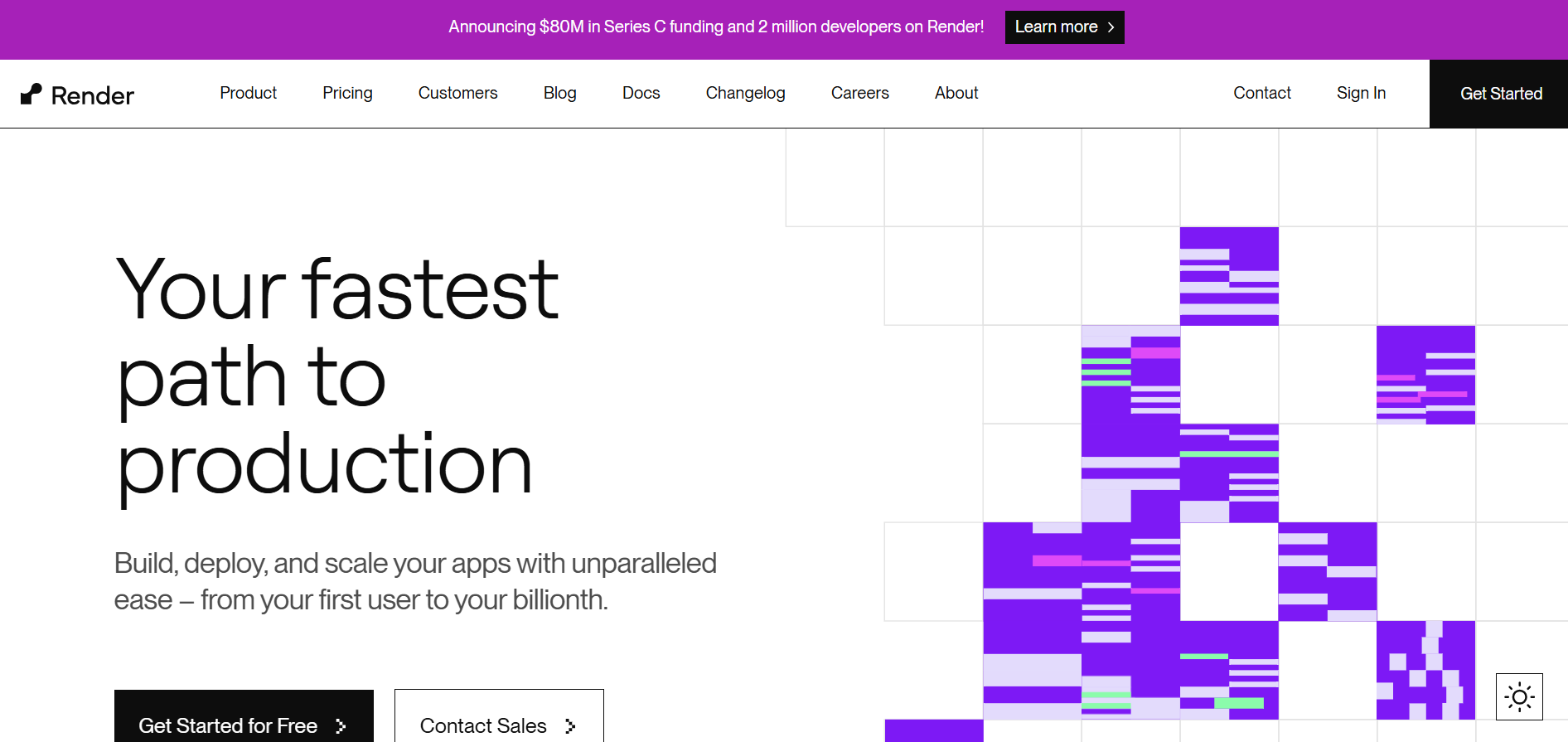
Render is a modern PaaS that focuses on simplifying the deployment and management of web applications. With features like automatic scaling, serverless functions, and cost-effective pricing, Render is gaining popularity among developers looking for an alternative to Heroku. Its intuitive interface makes deployment straightforward even for beginners.
Render vs Heroku
Render is a modern PaaS designed to simplify application deployment and scaling. Unlike Heroku, it offers competitive pricing and better resource allocation for developers and businesses.
Key Features of Render
Automatic SSL certificates for secure applications.
Serverless functions and web services.
Scalable databases and cron jobs.
Deployment from Git repositories.
Custom domains with built-in DNS management.
Render Pros
Cost-effective pricing for small to medium projects.
Excellent for deploying web apps, APIs, and static sites.
Simple and developer-friendly interface.
Free tier available for hobby projects.
Render Cons
Limited support for large-scale enterprise applications.
Fewer integrations compared to Heroku.
Free tier has resource limitations.
Render Pricing
Render's free tier offers basic deployment features. Paid plans start at $7 per month, making it an affordable alternative to Heroku.
7. Fly.io
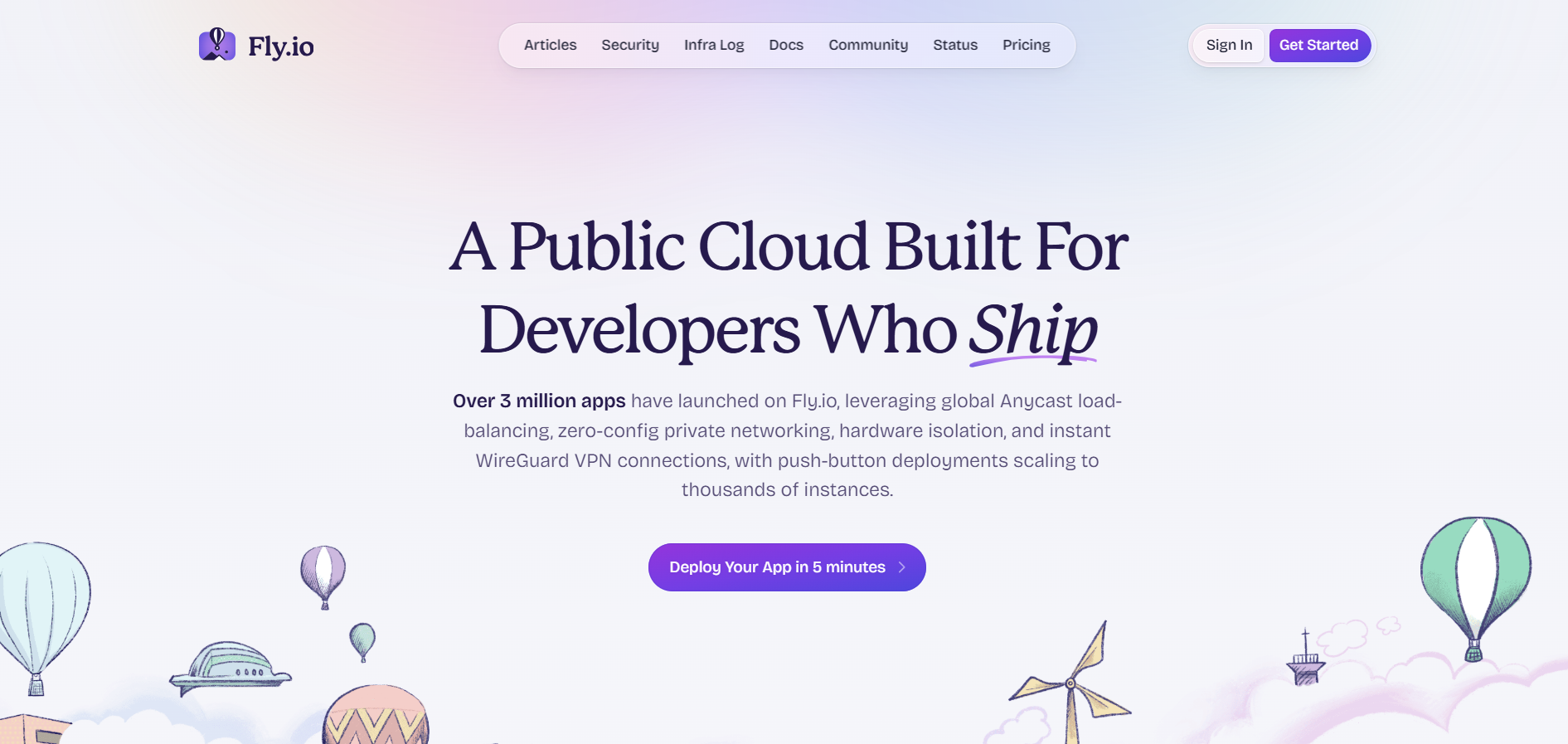
Fly.io is a distributed application platform that brings apps closer to users by deploying them globally. It is optimized for low-latency applications and offers unique features like edge deployments and global scaling. Fly.io is a great choice for developers building real-time or location-sensitive applications.
Fly.io vs Heroku
Fly.io is a distributed PaaS that focuses on deploying applications closer to users. It offers unique capabilities such as edge deployment and low-latency performance, setting it apart from Heroku.
Key Features of Fly.io
Deploy applications to multiple global regions.
Built-in support for Docker containers.
Automatic scaling and load balancing.
Low-latency performance for edge applications.
Free SSL certificates for secure connections.
Fly.io Pros
Optimized for low-latency applications.
Unique edge deployment capabilities.
Simple pricing with a free tier for small projects.
Supports Docker and containerized applications.
Fly.io Cons
Limited ecosystem compared to larger platforms.
Not ideal for resource-intensive applications.
Free tier has limited monthly usage.
Fly.io Pricing
Fly.io offers a free tier for basic applications. Paid plans depend on resource usage and additional features.
8. Netlify
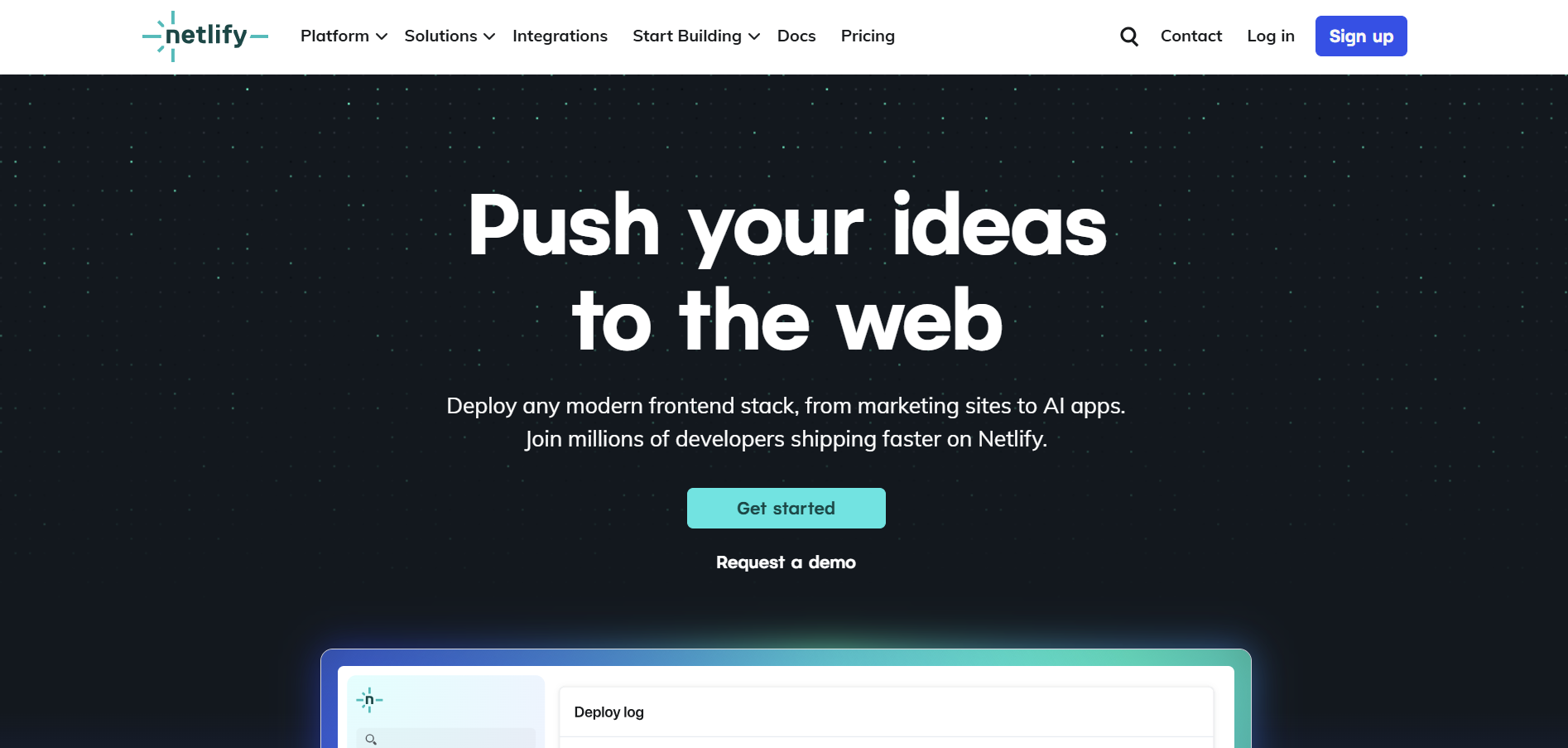
Netlify is a powerful platform for deploying static sites and serverless applications. It’s widely used by frontend developers for its ease of use, seamless Git integration, and global content delivery network. Netlify is ideal for modern web development workflows, particularly JAMstack-based projects.
Netlify vs Heroku
Netlify is a modern platform for frontend deployment and serverless backend functions. Compared to Heroku, it focuses on delivering fast and optimized performance for static sites and JAMstack applications.
Key Features of Netlify
Continuous deployment from Git repositories.
Global CDN for low-latency performance.
Serverless functions and edge handlers.
Built-in analytics and monitoring tools.
Free tier for personal projects.
Netlify Pros
Ideal for static sites and JAMstack applications.
Simple and fast deployment process.
Free tier available with generous limits.
Excellent for frontend-focused development.
Strong community and support.
Netlify Cons
Limited backend capabilities compared to Heroku.
Not suitable for database-driven applications.
Free tier may not suffice for high-traffic websites.
Netlify Pricing
Netlify offers a free tier for small-scale projects. Paid plans start at $19 per month for additional features and higher limits.
FAQs On Heroku Alternatives
1. What are the top alternatives to Heroku?
The top alternatives to Heroku include AWS Elastic Beanstalk, Google Cloud Platform, Microsoft Azure App Service, Vercel, DigitalOcean App Platform, Render, Fly.io, and Netlify. Each of these platforms offers unique features and pricing models to cater to different deployment needs.
2. Why should I consider using an alternative to Heroku?
You should consider using an alternative to Heroku if you require better scalability, more cost-effective solutions, or advanced features for specific use cases. Alternatives like AWS Elastic Beanstalk and Google Cloud Platform provide extensive control, while options like Render and Netlify offer simplified workflows and affordable pricing.
3. Are Heroku alternatives free to use?
Many Heroku alternatives offer free tiers or trials, including AWS Elastic Beanstalk, Vercel, Render, and Netlify. These free options are suitable for small-scale projects or testing, while paid plans provide more resources and features.
4. Which Heroku alternative is best for enterprise applications?
AWS Elastic Beanstalk, Google Cloud Platform, and Microsoft Azure App Service are excellent choices for enterprise applications. They provide robust infrastructure, advanced security, and scalability for handling large-scale deployments.
5. Can I migrate from Heroku to other platforms easily?
Yes, most Heroku alternatives support migration tools or processes to simplify the transition. Platforms like AWS Elastic Beanstalk and Render offer detailed guides and support for migrating applications and databases from Heroku.